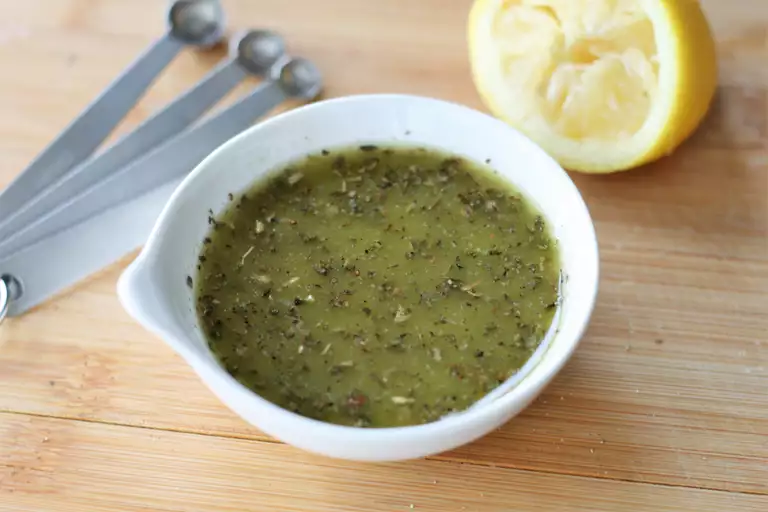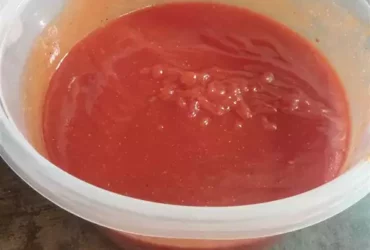Ingredients
Main Ingredients
The main ingredients for a traditional Greek chicken marinade recipe include:
- Olive oil: This is the base ingredient in many Greek marinades and serves as a carrier for the flavors of the other ingredients. Choose a high-quality extra virgin olive oil to get the most out of your dish.
- Lemon juice: Freshly squeezed lemon juice adds brightness and acidity to the marinade, balancing out the richness of the olive oil and seasonings. Use the juice of one or two lemons, depending on their size and your desired level of acidity.
- Garlic: Minced garlic is a fundamental component of many Greek sauces and marinades. It adds depth and a pungent flavor that pairs well with the other ingredients in this recipe.
- Oregano: This herb is a staple in Greek cuisine, often used to add a warm, earthy flavor to dishes. Choose fresh oregano leaves or use dried oregano as a substitute if necessary.
- Thyme: Similar to oregano, thyme adds a fragrant and slightly bitter flavor that complements the other ingredients in this marinade.
- Paprika: A sweet or smoked paprika can add a subtle smokiness to your chicken, while also contributing a rich, earthy flavor.
- Black pepper: This is another essential spice in Greek cuisine, used to add depth and heat to various dishes. Use freshly ground black pepper for the best results.
- Red pepper flakes (optional): For an extra kick of heat, add some red pepper flakes to your marinade. Start with a small amount (about 1/4 teaspoon) and adjust to taste.
Additional ingredients you can include in your Greek chicken marinade recipe are:
- Minced onion: Sauteed or caramelized onions can add a sweet, savory flavor to your chicken. Use about 1/4 cup of minced onion for every pound of chicken.
- Bay leaves: These leaves have a mild, slightly bitter flavor that pairs well with the other ingredients in this recipe. Add about 2-3 bay leaves to the marinade and remove them before cooking the chicken.
- Worcestershire sauce (optional): This condiment adds a savory, umami flavor to various dishes. Use it sparingly, as it can be quite strong. Start with about 1-2 teaspoons and adjust to taste.
Note that you can customize this marinade recipe to suit your personal taste preferences and dietary requirements. Feel free to experiment with different combinations of ingredients or omit any items that don’t agree with you.
1 cup olive oil
Olive oil is a staple ingredient in many Greek recipes, and it plays a crucial role in this chicken marinade recipe. Here’s what you need to know about using olive oil:
Why Olive Oil?
- Olives are native to Greece, making olive oil an authentic choice for traditional Greek recipes.
- Olive oil is rich in antioxidants and has anti-inflammatory properties, which can help tenderize the chicken and add flavor.
- Its high smoke point makes it ideal for cooking at high temperatures, like when grilling or broiling the chicken.
About This Recipe
The amount of olive oil used in this recipe is 1 cup, which may seem excessive, but trust us – it’s necessary. The acidity in the lemon juice and vinegar helps to balance out the richness of the olive oil.
How to Choose Olive Oil
- Look for extra-virgin olive oil (EVOO) as it has a higher quality and a more robust flavor than regular olive oil.
- Choose an EVOO with a high polyphenol content, which will give your marinade an added antioxidant boost.
Tips for Using Olive Oil
- Make sure to stir the marinade well before applying it to the chicken to ensure the flavors are evenly distributed.
- If you’re concerned about the amount of olive oil, start with a smaller amount (e.g., 3/4 cup) and adjust to taste.
In summary, 1 cup of olive oil is a crucial component in this Greek chicken marinade recipe. Its richness, antioxidants, and high smoke point make it an ideal choice for adding flavor and tenderness to the chicken. When choosing olive oil, opt for extra-virgin olive oil with high polyphenol content and use it liberally in the marinade.
2 cloves garlic, minced
In this Greek Chicken Marinade Recipe, the ingredient 2 cloves garlic, minced plays a crucial role in adding depth and complexity to the dish. Garlic is a fundamental component in many Mediterranean cuisines, including Greek cooking.
The use of garlic in this recipe serves multiple purposes. Firstly, it enhances the flavor profile of the chicken, giving it a pungent yet savory taste that complements the herbs and spices perfectly. Secondly, garlic contains natural antibacterial properties that help to preserve the chicken while it’s marinating, ensuring food safety.
When selecting garlic for this recipe, choose high-quality bulbs with firm, compact heads and papery white skins. These characteristics indicate that the garlic is fresh and will yield a more intense flavor when minced. Freshness also affects the texture of the minced garlic – cloves that are past their prime may become dry and crumbly.
To mince garlic effectively, use a chef’s knife to peel each clove and then chop it into small, uniform pieces. A food processor or blender can be used as well, but be careful not to over-process the garlic, which can result in an unpleasant paste-like consistency.
When mixing the minced garlic with other ingredients in the marinade, start by adding a small amount (about 1/4 teaspoon) and taste the mixture. This allows you to adjust the seasoning as needed, ensuring that the garlic flavor doesn’t overpower the rest of the dish. It’s also essential to balance the sweetness of the ingredients (such as honey or lemon juice) with the pungency of the garlic.
Overall, 2 cloves garlic, minced is a vital ingredient in this Greek Chicken Marinade Recipe, adding an unparalleled depth and richness to the flavor profile. By understanding its role, selecting high-quality garlic, and using it effectively in the marinade, you can create a dish that is both authentic and delicious.
The use of garlic also helps to preserve the chicken by preventing the growth of bacteria, which makes this recipe safe for consumption.
2 tablespoons freshly squeezed lemon juice
The addition of 2 tablespoons of freshly squeezed lemon juice to a Greek chicken marinade recipe serves several purposes and plays a crucial role in the overall flavor profile of the dish.
Lemon juice, as a acidic ingredient, helps to break down the proteins on the surface of the meat, making it easier for the flavors of the other ingredients to penetrate deeper into the muscle tissue. This results in more even and intense flavor distribution throughout the chicken when cooked.
The citrus flavor provided by lemon juice is also an essential element in Greek cuisine, often used to balance out richer or fattier flavors found in dishes like moussaka, souvlaki, or spanakopita. In this marinade recipe, it adds a bright and uplifting quality that complements the other herbs and spices.
Furthermore, lemon juice is rich in vitamin C, an antioxidant that can help to preserve the texture and color of the chicken when stored. Although cooking will denature some of these compounds, the use of fresh lemon juice contributes to a generally healthier and more nutritious dish.
In terms of culinary technique, the addition of freshly squeezed lemon juice helps to enhance the Maillard reaction during the cooking process. This chemical reaction is responsible for the formation of new flavor compounds and browning of the meat when exposed to heat, resulting in a richer and more complex taste experience.
1 teaspoon dried oregano
Dried oregano is one of the essential herbs used in this traditional Greek marinade recipe, adding a pungent and slightly bitter flavor to the dish.
The recommended amount of dried oregano for this recipe is 1 teaspoon, which may seem like a small quantity but plays a crucial role in achieving the perfect balance of flavors.
Oregano has a robust aroma that is often associated with Mediterranean cuisine, and when used judiciously, it can elevate the overall taste of the chicken to new heights.
In this particular recipe, the dried oregano works in tandem with other herbs like garlic, lemon juice, olive oil, salt, and black pepper to create a marinade that is both savory and aromatic.
The earthy flavor of the oregano complements the sweetness of the chicken and the tanginess of the lemon, while its pungency adds depth and warmth to the dish as a whole.
It’s worth noting that dried oregano can be used fresh or frozen, but for this recipe, it’s best to use the dried form to ensure the most intense flavor.
The key to using dried oregano effectively is to store it properly in an airtight container, away from light and moisture, which can cause the flavor to fade over time.
When substituting fresh oregano for dried, keep in mind that you’ll need about three times as much of the fresh herb to achieve the same intensity of flavor.
Overall, 1 teaspoon of dried oregano is a fundamental component of this Greek Chicken Marinade Recipe, and its unique flavor profile adds a rich and satisfying dimension to the dish.
1/2 teaspoon paprika
The Greek Chicken Marinade Recipe relies on a combination of aromatic spices and herbs to create a rich, savory flavor profile for marinated chicken. One of these key ingredients is paprika.
Paprika is a ground spice derived from dried bell peppers or sweet peppers, specifically varieties that are high in pigment and flavor compounds.
When selecting paprika for the Greek Chicken Marinade Recipe, it’s essential to choose the right type, as different types offer distinct flavors:
- Sweet paprika has a mild, sweet flavor and is often used in Spanish or Hungarian cuisine.
- Smoked paprika adds a smoky depth of flavor and is typically used in barbecue or grilled dishes.
In the context of this Greek Chicken Marinade Recipe, using sweet paprika would be ideal for its mild sweetness and lack of overpowering smoke flavors.
The amount called for in the recipe is 1/2 teaspoon, which represents a moderate use of paprika to complement the other spices without overwhelming them.
Making the Marinade
Instructions
The first step in making the perfect Greek Chicken Marinade Recipe is to prepare a mixture that will bring out the flavors and aromas of the Mediterranean region. This marinade is a key component in achieving tender, juicy chicken with a depth of flavor that complements the bold taste of traditional Greek cuisine.
To start, combine 1/2 cup (120 ml) of olive oil with 1/4 cup (60 g) of freshly squeezed lemon juice in a large bowl. The acidity in the lemon will help to break down the proteins in the meat and create an environment for the flavors to penetrate deeper into the chicken.
Next, peel and mince 2 cloves of garlic and add them to the bowl with the olive oil and lemon juice. Garlic is a fundamental flavor component in many Greek dishes, including the marinade. Its pungency will enhance the overall aroma and taste of the chicken.
Add 1 tablespoon (15 ml) of dried oregano to the mixture, which is another essential herb in Greek cuisine. Oregano has a slightly bitter flavor that pairs well with the sweetness of the lemon juice and the richness of the olive oil.
Now it’s time to add some heat to the marinade with 1/2 teaspoon (2.5 ml) of red pepper flakes or more to taste, depending on your desired level of spiciness. This will give the chicken a nice kick without overpowering the other flavors.
Crush 2 tablespoons (30 g) of fresh parsley and add it to the mixture. Parsley is often used as a garnish in Greek dishes, but its slightly bitter flavor also works well when added to marinades or sauces.
Finally, season the marinade with salt, black pepper, and any other desired herbs or spices you like. You can use 1/2 teaspoon (2.5 ml) of paprika for a smoky flavor or 1/4 teaspoon (1.25 ml) of ground cumin for a slightly earthy taste.
Mix all the ingredients together until they’re well combined and smooth. The marinade is now ready to use with your chicken, so proceed with cutting the chicken into pieces and adding it to the marinade. Make sure that each piece of chicken is coated evenly with the marinade by stirring and massaging the meat for about 5 minutes.
In a large bowl, whisk together olive oil, garlic, lemon juice, oregano and paprika.
To make the marinade for this delicious Greek chicken dish, you will need to combine a few key ingredients in a large bowl.
The process begins by whisking together olive oil, which provides a rich and creamy texture to the marinade. It’s essential to use high-quality olive oil for the best flavor.
Next, mince two cloves of garlic and add them to the bowl with the olive oil. Garlic is a fundamental ingredient in Greek cuisine and adds a pungent flavor to the marinade.
Mix in 1/2 cup of freshly squeezed lemon juice, which not only adds moisture but also provides a tangy taste that complements the other ingredients.
Add 2 teaspoons of dried oregano, another staple herb in Greek cuisine. Oregano has a distinct earthy flavor and aroma that pairs perfectly with chicken.
Finally, mix in 1 teaspoon of smoked paprika, which adds a smoky depth to the marinade and gives the chicken a rich, savory flavor.
To ensure the ingredients are well combined, whisk the mixture continuously until it’s smooth and well-emulsified.
Key Ingredients:
- Olive oil
- Garlic
- Lemon juice
- Oregano
- Smoked paprika
Tips and Variations:
- You can adjust the amount of garlic and lemon juice to suit your taste preferences.
- To make a more intense marinade, you can add other ingredients such as minced onion or chopped fresh herbs like parsley or dill.
- Make sure to whisk the mixture thoroughly before adding it to the chicken to ensure even distribution of flavors.
Pour in chicken broth if desired for added moisture and flavor.
- To make the marinade for this Greek-inspired dish, start by combining 1/2 cup of olive oil with 1/4 cup of freshly squeezed lemon juice.
- Next, add 4 cloves of minced garlic to the mixture, along with 1 tablespoon of Dijon mustard and 1 teaspoon of dried oregano.
- Then, mix in 1 teaspoon of paprika and 1/2 teaspoon of salt, followed by a pinch of black pepper to taste.
- Pour in chicken broth if desired for added moisture and flavor. A general rule of thumb is to use about 2 tablespoons of chicken broth per cup of marinade.
- However, feel free to adjust the amount according to your personal preference or the specific needs of your dish.
- If you’re using a blender or food processor to mix the marinade, be sure to pulse the ingredients gently to avoid over-processing and creating a smooth paste.
- On the other hand, if you prefer a more rustic texture, you can simply stir the ingredients together in a bowl until well combined.
- Once your marinade is prepared, it’s time to add the chicken! Place your favorite cut of poultry (such as breasts or thighs) into a large zip-top plastic bag or a shallow dish, and pour the marinade over the top.
- Making sure that the chicken is fully coated in the marinade, seal the bag or cover the dish with plastic wrap, and refrigerate for at least 30 minutes to allow the flavors to meld together.
Tips and Variations
Enhance the Flavor
To enhance the flavor of your Greek chicken marinade recipe, consider incorporating a variety of ingredients that complement the classic combination of olive oil, lemon juice, garlic, and herbs. Some tips and variations to try include:
Spice it up: Add some heat to your marinade by incorporating red pepper flakes or diced jalapeños. This will give your chicken a nice kick and add depth to its flavor profile.
Use different types of citrus: While lemon juice is a classic choice, you can also try using lime, orange, or grapefruit juice to create a unique twist on the marinade.
Experiment with different herbs: In addition to traditional oregano and thyme, consider adding other herbs like rosemary, sage, or bay leaves to your marinade for added complexity.
Add some acidity: Vinegar, such as red wine vinegar or apple cider vinegar, can help to balance out the richness of the olive oil and create a brighter, more refreshing flavor profile.
Try using different types of oil: While olive oil is a classic choice, you can also try using grapeseed oil or avocado oil for their lighter, neutral flavors.
Add some aromatics: Onions, shallots, and garlic are all great additions to your marinade, but you can also try using other aromatics like ginger or lemongrass for added depth.
Let it sit: Allow the chicken to marinate for at least 30 minutes to an hour, but ideally overnight in the refrigerator, to allow the flavors to penetrate deep into the meat.
Grilling and roasting options: You can grill or roast your chicken with this marinade, depending on your preference. If grilling, make sure to cook it over medium-high heat for about 5-7 minutes per side, or until it reaches an internal temperature of 165°F (74°C). If roasting, preheat your oven to 400°F (200°C) and roast the chicken for about 20-25 minutes, or until it reaches an internal temperature of 165°F (74°C).
Add some heat with red pepper flakes or chopped fresh hot peppers.
Add an extra kick to your Greek Chicken Marinade with the addition of some heat!
To incorporate heat into your marinade, you can add one of the following options:
- Red Pepper Flakes: Add a pinch of red pepper flakes to the marinade for an instant boost of heat. Start with a small amount (about 1/4 teaspoon) and adjust to taste. You can always add more, but it’s harder to remove the heat once it’s added.
- Chopped Fresh Hot Peppers: If you prefer a more nuanced heat, try adding some chopped fresh hot peppers, such as jalapeños or serrano peppers, to the marinade. Use about 1-2 tablespoons of chopped peppers and adjust to taste.
Some other variations you can try to add depth and heat to your Greek Chicken Marinade include:
- Cumin: Add a pinch of cumin powder to the marinade for a warm, earthy flavor that complements the herbal notes of oregano and thyme.
- Smoked Paprika: Add a pinch of smoked paprika to the marinade for a smoky depth that pairs well with the rich flavors of olive oil and lemon juice.
Lemon Zest:
- Add some grated lemon zest to the marinade for an extra burst of citrus flavor and aroma.
- Remember, when working with hot peppers or red pepper flakes, be sure to handle them carefully and avoid touching your eyes or other sensitive areas after handling. Happy grilling!
Mix in some chopped onion, bell pepper, or mushrooms for extra texture and nutrients, as recommended by Harvard Health Publishing.
To elevate this classic Greek Chicken Marinade recipe, consider incorporating various ingredients that not only enhance flavor but also add texture and nutrients.
As suggested by Harvard Health Publishing, mixing in some finely chopped onion, bell pepper, or mushrooms can be a great way to boost the nutritional value of this dish.
Here are some tips for incorporating these ingredients:
- Add minced onion and garlic at the beginning of the marinade process. This will allow the flavors to meld together and intensify over time.
- Use a food processor or blender to finely chop bell peppers and mix them into the marinade for added crunch.
- Cooked mushrooms can be pureed with some lemon juice, olive oil, and herbs like oregano and thyme to create a savory sauce that’s perfect for marinating chicken.
Other variations to consider:
- Add some heat by mixing in diced jalapenos or red pepper flakes.
- Get creative with different types of citrus, such as lime or orange juice.
- Try using other types of vinegar, like apple cider or balsamic, to give the marinade a distinct flavor.
Remember, the key is to balance flavors and textures so that each bite is both delicious and satisfying. Feel free to experiment with different combinations of ingredients to create your own signature Greek Chicken Marinade recipe!
- Best Datanyze Alternatives for 2025 - April 24, 2025
- Best Hunter.io Alternatives for 2025 - April 22, 2025
- Best Lead411 Alternatives for 2025 - April 22, 2025















